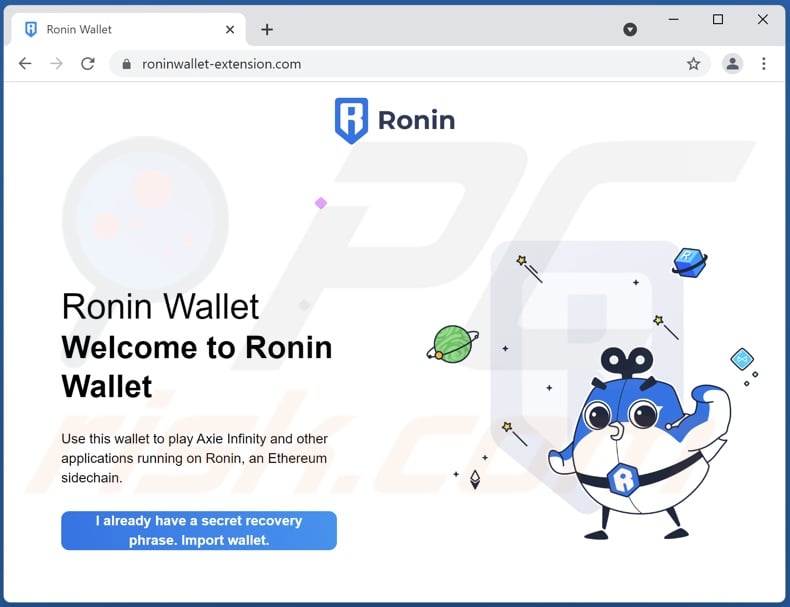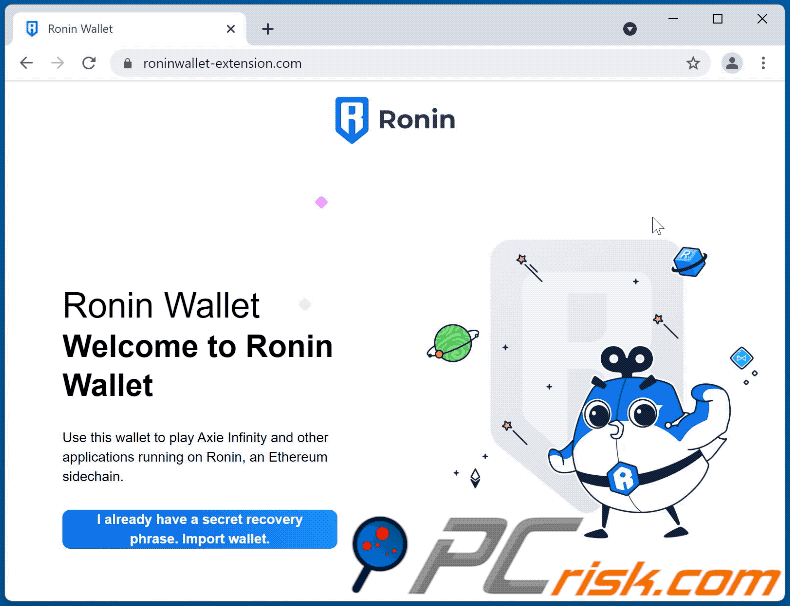Avoid having your wallet stolen by a fake "Ronin Wallet" website
Phishing/ScamAlso Known As: Ronin Wallet scam website
Get free scan and check if your device is infected.
Remove it nowTo use full-featured product, you have to purchase a license for Combo Cleaner. Seven days free trial available. Combo Cleaner is owned and operated by RCS LT, the parent company of PCRisk.com.
What is the "Ronin Wallet" scam?
During a routine inspection of sites that use rogue advertising networks, our research team discovered a webpage promoting a scam "Ronin Wallet". This phishing scam targets the log-in credentials of users' Ronin digital wallets. With this information in their possession, the cyber criminals may gain access/control over the exposed cryptowallets and the funds stored therein.

"Ronin Wallet scam" scam overview
When we accessed the website running this scam, we learned that it uses graphical imagery associated with the actual Ronin wallet. The main page described the Ronin cryptocurrency wallet and had a button with the statement "I already have a secret recovery phrase. Import wallet." presented on it.
Once this button was pressed, a different page was opened - which proceeded to instruct how to import the wallet. This webpage requested users to provide their seed phrases (passphrases) and to confirm their password twice.
As mentioned in the introduction, this site is fake. By entering this information - users will reveal it to the cyber criminals behind this scam. Therefore, victims of this phishing scheme can experience significant financial losses by having their Ronin wallets stolen.
| Name | Ronin Wallet scam website |
| Threat Type | Phishing, Scam, Social Engineering, Fraud |
| Disguise | Scam page is disguised as the Ronin wallet. |
| Related Domains | roninwallet-extension[.]com, roninchat.pages[.]dev |
| Detection Names (roninwallet-extension[.]com) | Combo Cleaner (Phishing), Emsisoft (Phishing), ESET (Phishing), Fortinet (Phishing), Kaspersky (Phishing), Full List Of Detections (VirusTotal) |
| Serving IP Address (roninwallet-extension[.]com) | 172.96.191.98 |
| Distribution methods | Compromised websites, rogue online pop-up ads, potentially unwanted applications. |
| Damage | Loss of sensitive private information, monetary loss, identity theft, possible malware infections. |
| Malware Removal (Windows) |
To eliminate possible malware infections, scan your computer with legitimate antivirus software. Our security researchers recommend using Combo Cleaner. Download Combo CleanerTo use full-featured product, you have to purchase a license for Combo Cleaner. 7 days free trial available. Combo Cleaner is owned and operated by RCS LT, the parent company of PCRisk.com. |
Cryptocurrency-themed scam examples
With the rise in popularity of digital currencies like cryptocurrencies and NFTs (Non-Fungible Tokens), scammers reacted accordingly and began creating various scams targeting them.
We have analyzed dozens of such schemes; the most common types include phishing that targets cryptowallet log-in credentials (e.g., "Wallet Access Connect", "Sync Wallets", "METAMASK scam", etc.) and fake cryptocurrency giveaways (e.g., "1INCH Giveaway", "CoinMarketCap Giveaway", "NASA ETH and BTC Giveaway", etc.).
Due to the prevalence of misleading, deceptive, and malicious content online, we strongly advise exercising caution when browsing.
How did I open a scam website?
Scam webpages can be accessed through sites that use rogue advertising networks. Deceptive pages can either be force-opened upon access or when hosted content (e.g., ads, links, buttons, etc.) is clicked.
Online scams are also promoted by intrusive advertisements and spam browser notifications. Mistyping a website's address (URLs) can cause a redirect that lands on a deceptive page.
Adware is known to endorse scams as well. This software can display ads that promote them or force-open their webpages.
How to avoid visiting scam websites?
We strongly advise against using sites that offer pirated content or questionable services (e.g., Torrenting, illegal streaming/downloading, etc.) - as they are typically monetized through rogue advertising networks, which commonly promote online scams.
To avoid receiving browser notification spam that endorses deceptive webpages, do not click "Allow", "Allow Notifications", or similar options presented by questionable websites. Instead, ignore or deny notification delivery (i.e., select "Block", "Block Notifications", etc.).
We highly recommend researching software and downloading it only from official/verified sources - to avoid installing adware and other harmful software. Additionally, when installing - read terms, study possible options, and use the "Custom/Advanced" settings to opt-out of all apps, tools, and other supplements.
If your computer is already infected, we recommend running a scan with Combo Cleaner Antivirus for Windows to automatically eliminate all threats.
Text presented in the "Ronin Wallet" scam:
Ronin
Ronin Wallet
Welcome to Ronin Wallet
Use this wallet to play Axie Infinity and other applications running on Ronin, an Ethereum sidechain.
I already have a secret recovery phrase. Import wallet.
The appearance of "Ronin Wallet" pop-up scam (GIF):

Another variant of Ronin Wallet-themed scam website (roninchat.pages[.]dev):
![Ronin Wallet-themed scam website (roninchat.pages[.]dev)](/images/stories/screenshots202407/ronin-wallet-pop-up-scam-update-2024-07-10-another-variant.jpg)
Instant automatic malware removal:
Manual threat removal might be a lengthy and complicated process that requires advanced IT skills. Combo Cleaner is a professional automatic malware removal tool that is recommended to get rid of malware. Download it by clicking the button below:
DOWNLOAD Combo CleanerBy downloading any software listed on this website you agree to our Privacy Policy and Terms of Use. To use full-featured product, you have to purchase a license for Combo Cleaner. 7 days free trial available. Combo Cleaner is owned and operated by RCS LT, the parent company of PCRisk.com.
Quick menu:
- What is Ronin Wallet scam website?
- How to identify a pop-up scam?
- How do pop-up scams work?
- How to remove fake pop-ups?
- How to prevent fake pop-ups?
- What to do if you fell for a pop-up scam?
How to identify a pop-up scam?
Pop-up windows with various fake messages are a common type of lures cybercriminals use. They collect sensitive personal data, trick Internet users into calling fake tech support numbers, subscribe to useless online services, invest in shady cryptocurrency schemes, etc.
While in the majority of cases these pop-ups don't infect users' devices with malware, they can cause direct monetary loss or could result in identity theft.
Cybercriminals strive to create their rogue pop-up windows to look trustworthy, however, scams typically have the following characteristics:
- Spelling mistakes and non-professional images - Closely inspect the information displayed in a pop-up. Spelling mistakes and unprofessional images could be a sign of a scam.
- Sense of urgency - Countdown timer with a couple of minutes on it, asking you to enter your personal information or subscribe to some online service.
- Statements that you won something - If you haven't participated in a lottery, online competition, etc., and you see a pop-up window stating that you won.
- Computer or mobile device scan - A pop-up window that scans your device and informs of detected issues - is undoubtedly a scam; webpages cannot perform such actions.
- Exclusivity - Pop-up windows stating that only you are given secret access to a financial scheme that can quickly make you rich.
Example of a pop-up scam:

How do pop-up scams work?
Cybercriminals and deceptive marketers usually use various advertising networks, search engine poisoning techniques, and shady websites to generate traffic to their pop-ups. Users land on their online lures after clicking on fake download buttons, using a torrent website, or simply clicking on an Internet search engine result.
Based on users' location and device information, they are presented with a scam pop-up. Lures presented in such pop-ups range from get-rich-quick schemes to fake virus scans.
How to remove fake pop-ups?
In most cases, pop-up scams do not infect users' devices with malware. If you encountered a scam pop-up, simply closing it should be enough. In some cases scam, pop-ups may be hard to close; in such cases - close your Internet browser and restart it.
In extremely rare cases, you might need to reset your Internet browser. For this, use our instructions explaining how to reset Internet browser settings.
How to prevent fake pop-ups?
To prevent seeing pop-up scams, you should visit only reputable websites. Torrent, Crack, free online movie streaming, YouTube video download, and other websites of similar reputation commonly redirect Internet users to pop-up scams.
To minimize the risk of encountering pop-up scams, you should keep your Internet browsers up-to-date and use reputable anti-malware application. For this purpose, we recommend Combo Cleaner Antivirus for Windows.
What to do if you fell for a pop-up scam?
This depends on the type of scam that you fell for. Most commonly, pop-up scams try to trick users into sending money, giving away personal information, or giving access to one's device.
- If you sent money to scammers: You should contact your financial institution and explain that you were scammed. If informed promptly, there's a chance to get your money back.
- If you gave away your personal information: You should change your passwords and enable two-factor authentication in all online services that you use. Visit Federal Trade Commission to report identity theft and get personalized recovery steps.
- If you let scammers connect to your device: You should scan your computer with reputable anti-malware (we recommend Combo Cleaner Antivirus for Windows) - cyber criminals could have planted trojans, keyloggers, and other malware, don't use your computer until removing possible threats.
- Help other Internet users: report Internet scams to Federal Trade Commission.
Frequently Asked Questions (FAQ)
What is a pop-up scam?
Pop-up scams are essentially deceptive messages that trick users into performing specific actions, e.g., disclosing private data, making monetary transactions, calling fake helplines, downloading/installing software, and so on.
What is the purpose of a pop-up scam?
Regardless of their platforms, all scams aim to generate revenue, and those promoted online are no different. Cyber criminals can profit primarily by obtaining funds through deception, abusing or selling sensitive information, promoting (likely fake or harmful) applications, and distributing malware.
I have provided my personal information when tricked by a pop-up scam, what should I do?
If you entered account credentials - immediately change the passwords/passphrases of all potentially exposed accounts and inform their official support. And if you have disclosed other private data (e.g., credit card numbers, ID card details, etc.) - contact the appropriate authorities without delay.
Why do I encounter fake pop-ups?
Pop-up scams are run on rogue websites, which are usually accessed inadvertently. Most users enter them through redirects caused by intrusive ads, sites that use rogue advertising networks, spam browser notifications, mistyped URLs, or installed adware.
Will Combo Cleaner protect me from pop-up scams?
Combo Cleaner can scan every single website you visit and warn you if any of them are detected as deceptive or malicious. Furthermore, it can block all further access to such sites.
Share:

Tomas Meskauskas
Expert security researcher, professional malware analyst
I am passionate about computer security and technology. I have an experience of over 10 years working in various companies related to computer technical issue solving and Internet security. I have been working as an author and editor for pcrisk.com since 2010. Follow me on Twitter and LinkedIn to stay informed about the latest online security threats.
PCrisk security portal is brought by a company RCS LT.
Joined forces of security researchers help educate computer users about the latest online security threats. More information about the company RCS LT.
Our malware removal guides are free. However, if you want to support us you can send us a donation.
DonatePCrisk security portal is brought by a company RCS LT.
Joined forces of security researchers help educate computer users about the latest online security threats. More information about the company RCS LT.
Our malware removal guides are free. However, if you want to support us you can send us a donation.
Donate
▼ Show Discussion